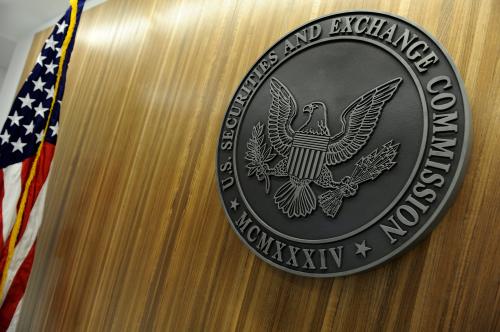The House voted 390 to 23 last week for a bill (PDF) to provide regulatory relief for small companies trying to raise capital. The bill is moving quickly through the Senate; no one likes unnecessary regulations that burden economic growth.
But this bill does more than trim regulatory fat; parts of it cut into muscle. Small businesses will have a harder time raising capital if investors do not receive sufficient disclosures or other legal protections.
First, the bill would allow “crowd-financing” under astonishingly flexible conditions. It would displace current Securities and Exchange Commission disclosure rules for public offerings, allowing a new venture to raise $1 million through widespread Internet solicitations as long as no single investor put in more than $10,000. But the loosened regulations would make it easier for future Bernie Madoffs to create, say, 50 fake firms, steal $50 million from unsuspecting investors and retire to a tropical island.
If Congress wants to allow crowd-financing, it should impose a lower maximum for each investor and an aggregate cap for any crowd-financing site. Internet sites that engage regularly in such financing should be subject to oversight as brokers are, or under a new regulatory category.
Crowd-financed entrepreneurs should supply a basic business plan to investors and should be personally subject to anti-fraud liability for deceptive offerings. These offerings should not be exempt from state securities laws, as the House bill would allow.
Second, the bill would eliminate the existing ban on general advertising, which limits most private-securities offerings to the relatively small number of accredited investors who can be contacted through private channels. Absent this ban, unscrupulous promoters will, without any SEC oversight, market stock via the Internet and launch mass mailings to millions of unsophisticated investors.
If Congress permits unregulated offerings through general advertising, sponsors should be required to verify that those who purchase the securities are “accredited” — with sufficient resources to understand and bear the risks of such investments. It should not be enough for investors to simply say they are accredited, as is now common in private-securities markets.
Congress should also update the criteria for purchasers in unregulated private offerings. The SEC established these criteria — income of $200,000 or net worth of $1 million — 30 years ago, when only 1.6 percent of U.S. households qualified. Inflation has quadrupled the percentage of qualifying households.
Congress should return the definition of accredited investors to levels where they are likely to be capable of understanding and bearing substantial risks. Congress could, for example, increase eligibility to purchase private offerings to those with incomes of more than $600,000 or net worth of $3 million.
Third, the bill would raise the threshold requiring companies to issue public financial reports from 500 shareholders to 2,000. This legislative exemption would also exclude from this 2,000 threshold any shareholders employed by the company. These changes would dramatically reduce the number of public companies required to publish annual and quarterly reports for investors. More than two-thirds of all public companies would be exempt under the bill’s new criterion.
Such information helps keep stock prices accurate and guides the allocation of capital to productive companies. Without regular reports, shareholders have little idea of how to value securities traded on U.S. markets.
We do agree with the proposal to exclude employee shareholders. Many small companies use stock options to attract talent. Once this change is made, we believe companies with more than 500 shareholders should continue to publish reports.
Finally, the bill encourages initial public offerings by reducing regulatory requirements. For example, the bill would require only two years of audited financial reports, instead of three years, for offerings by small companies. Once public, these companies could avoid some burdens imposed on large companies, such as auditor attestation of internal controls and shareholder advisory votes on compensation.
Although we generally support these proposals, they apply to an overly broad range of companies — those with less than $1 billion in revenue or an offering size under $700 million. Under these criteria, more than 90 percent of initial public offerings in 2011 would have been considered “small.” Congress should adopt a more realistic definition of a small business, such as one with fewer than $400 million in annual revenue.
There are powerful political temptations to encourage growth by reducing regulations on raising capital. But the bill before the Senate goes too far and could spur more shady deals than new jobs. The Senate should rewrite the bill along the lines we suggest and set the legislation to sunset after three years. Toward the end of that window, Congress should evaluate the bill’s actual impact on small business and the investing public.
The Brookings Institution is committed to quality, independence, and impact.
We are supported by a diverse array of funders. In line with our values and policies, each Brookings publication represents the sole views of its author(s).








Commentary
Op-edBill to Help Businesses Raise Capital Goes Too Far
March 15, 2012